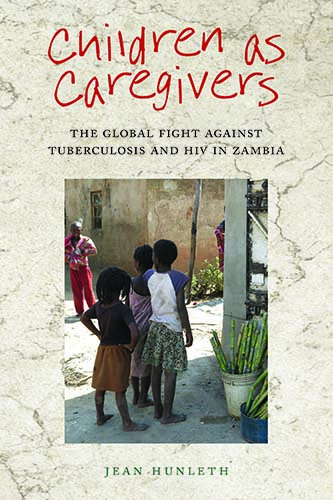Children as Caregivers: The Global Fight against Tuberculosis and HIV in Zambia
Rutgers University Press, Series in Childhood Studies
Publication date: March 3, 2017
Purchase online: Rutgers University Press, Amazon.com, Amazon UK, BarnesandNoble.com, Indie Bound, EuroSpan Bookstore, or other online retail stores.
News release from the Division of Public Health Sciences at Washington University School of Medicine in St. Louis

“Hunleth presents a moving, yet clear-eyed, account of children’s hitherto unacknowledged caregiving in the tuberculosis and HIV epidemic. Children as Caregivers is a spectacular demonstration of the vital importance of detailed ethnography for policy development.” – Anthony Simpson, author of Boys to Men in the Shadow of AIDS: Masculinities and HIV Risk in Zambia
“Children as Caregivers makes important contributions to a number of fields, including medical anthropology, global health, human rights studies, household research in Africa and the anthropology of children and childhoods. Hunleth’s research could not be more important or more timely given the way that HIV related illnesses, such as tuberculosis, are changing and challenging traditional expectations about the roles and responsibilities of women, men and, especially, children in urban households in Zambia and elsewhere in Africa and around the world.” – Helen B. Schwartzman, Professor Emerita of Anthropology, Northwestern University
In Zambia, due to the rise of tuberculosis and the closely connected HIV epidemic, a large number of children have experienced the illness or death of at least one parent. Children as Caregivers examines how well-intentioned practitioners fail to realize that children take on active caregiving roles when their guardians become seriously ill and demonstrates why understanding children’s care is crucial for global health policy.
Using ethnographic methods, and listening to the voices of the young as well as adults, Jean Hunleth makes the caregiving work of children visible. She shows how children actively seek to “get closer” to ill guardians by providing good care. Both children and ill adults define good care as attentiveness of the young to adults’ physical needs, the ability to carry out treatment and medication programs in the home, and above all, the need to maintain physical closeness and proximity. Children understand that losing their guardians will not only be emotionally devastating, but that such loss is likely to set them adrift in Zambian society, where education and advancement depend on maintaining familial, reciprocal relationships.
Jean Hunleth is an assistant professor of surgery in the Division of Public Health Sciences at Washington University School of Medicine in St. Louis, Missouri.
View some of the children’s illustrations in the photo gallery or on Flickr.